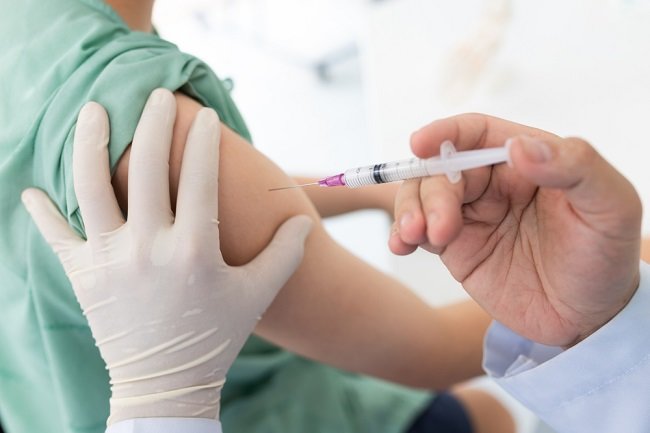Goserelin is a hormone preparation used to treat prostate cancer in men or breast cancer in women. This drug is also used in the treatment of endometriosis, which is the growth of uterine tissue outside the uterus, as well as in the treatment of abnormal bleeding from the uterus.
Goserelin is a drug that belongs to the class gonadotropin releasing hormone agonist (GnRH). This drug works by affecting the pituitary gland to reduce the production of the hormone testosterone in men and the hormone estrogen in women. With reduced production of these hormones, the growth of prostate cancer cells or breast cancer cells can be inhibited.

Goserelin trademark: Zoladex, Zoladex LA
What's that Goserelin
| group | Prescription drugs |
| Category | Hormone therapy |
| Benefit | Overcoming prostate cancer and breast cancer |
| Used by | Mature |
| Goserelin for pregnant and lactating women | Category X:Studies in experimental animals and humans have demonstrated fetal abnormalities or a risk to the fetus. Drugs in this category should not be used by women who are or may become pregnant. It is not known whether or not it is absorbed into breast milk. If you are breastfeeding, do not use this medicine without consulting your doctor first. |
| Drug form | Implant injection |
Precautions Before Using Goserelin
Goserelin should only be used according to a doctor's prescription. There are several things you should pay attention to before using goserelin, namely:
- Tell your doctor about any allergies you have. Goserelin should not be used in patients who are allergic to this drug or to other homonal drugs, such as leuprolide, nafarelin, or ganirelix.
- Tell your doctor if you smoke or are addicted to alcohol.
- Tell your doctor if you or your family have or have had osteoporosis or a heart rhythm disorder called QT prolongation.
- Tell your doctor if you have or have ever had heart disease, spinal disorders, heart attack, stroke, diabetes, urinary difficulties, liver disease, abnormal vaginal bleeding, or arrhythmias.
- Tell your doctor if you are pregnant, breastfeeding, or planning a pregnancy. Use birth control to prevent pregnancy while on treatment with goserelin.
- Tell your doctor if you are taking certain medications, supplements, or herbal products.
- See your doctor right away if you experience an allergic drug reaction, overdose, or serious side effect after using goserelin.
Dosage and Rules of Use Goserelin
Goserelin should only be given by a doctor or medical officer under the supervision of a doctor. The following is the dose of goserelin that will be injected into adult patients based on the condition to be treated:
- Condition: Prostate cancer that has spread (metastasized)
The dose is 3.6 mg every 28 days or 10.8 mg every 12 weeks.
- Condition: Breast cancer
The dose is 3.6 mg every 28 days.
- Condition: Endometrial thinning before endometrial ablation surgery
The dose is 3.6 mg as a single dose, 4 weeks before surgery. Another alternative dose is 3.6 mg given 2 times with an interval of 4 weeks. Surgery is performed 2–4 weeks after the second dose.
- Condition: Endometriosis
The dose is 3.6 mg every 28 days, the maximum duration of treatment is 6 months.
- Condition: Miom
The dose is 3.6 mg every 28 days, the duration of treatment is up to 3 months before surgery.
How to Use Goserelin Correctly
Goserelin is only available as an implantable injection. This medicine should only be given by a doctor or medical personnel under the supervision of a doctor. Goserelin is given by injection under the skin in the abdomen.
Goserelin is generally given every 4–12 weeks. Try to stick to the schedule of drug injections. Schedule regular doctor visits to avoid delays in dosing, as well as to monitor disease progression and response to treatment.
If you miss a scheduled goserelin injection, see your doctor immediately and make an appointment for the missed dose of the drug as soon as possible. Do not stop treatment with goserelin without consulting your doctor first.
Goserelin Interactions with Other Drugs
The use of goserelin together with other drugs can cause several drug interactions, including:
- Increased risk of QT prolongation if used with quinidine, disopyramide, amiodarone, ceritinib, sotalol, dolasetron, dofetilide, moxifloxacin, methadone, or antipsychotic drugs
- Increased risk of ovarian hyperstimulation when used with other hormones that affect gonadotropins
Goserelin Side Effects and Dangers
Some of the side effects that can occur after using goserelin are:
- Feeling hot or stifling (hot flash)
- Headaches, tension, depression, inability to control emotions or even emotions quickly change
- Redness in the neck, face, or upper chest
- Pain in the breast or increase in breast size
- Decreased sexual desire or pain during intercourse
- Vaginal dry, itchy, or vaginal discharge
- Pain, redness, and swelling at the injection site
- Sleep disturbance
- Swelling in the hands or feet
Consult a doctor if these side effects do not improve or get worse. You need to see a doctor immediately if you experience an allergic drug reaction or more serious side effects, such as:
- Difficulty or pain when urinating, bloody urine, or severe back pain
- Severe headache, vomiting, or blurry eyes
- High blood sugar levels, which can be characterized by persistent thirst, frequent urination, hunger, dry mouth, dry skin, or frequent drowsiness
- Symptoms of a heart attack, such as chest pain that radiates to the shoulder or jaw, chest pressure, nausea, and sweating
- Nerve disorders, which can be characterized by back pain, muscle weakness, impaired coordination of movement or balance, and numbness or tingling in the legs
- Symptoms of a stroke, such as numbness or weakness on one side of the body, suddenly feeling very dizzy, stuttering, and impaired balance or vision









